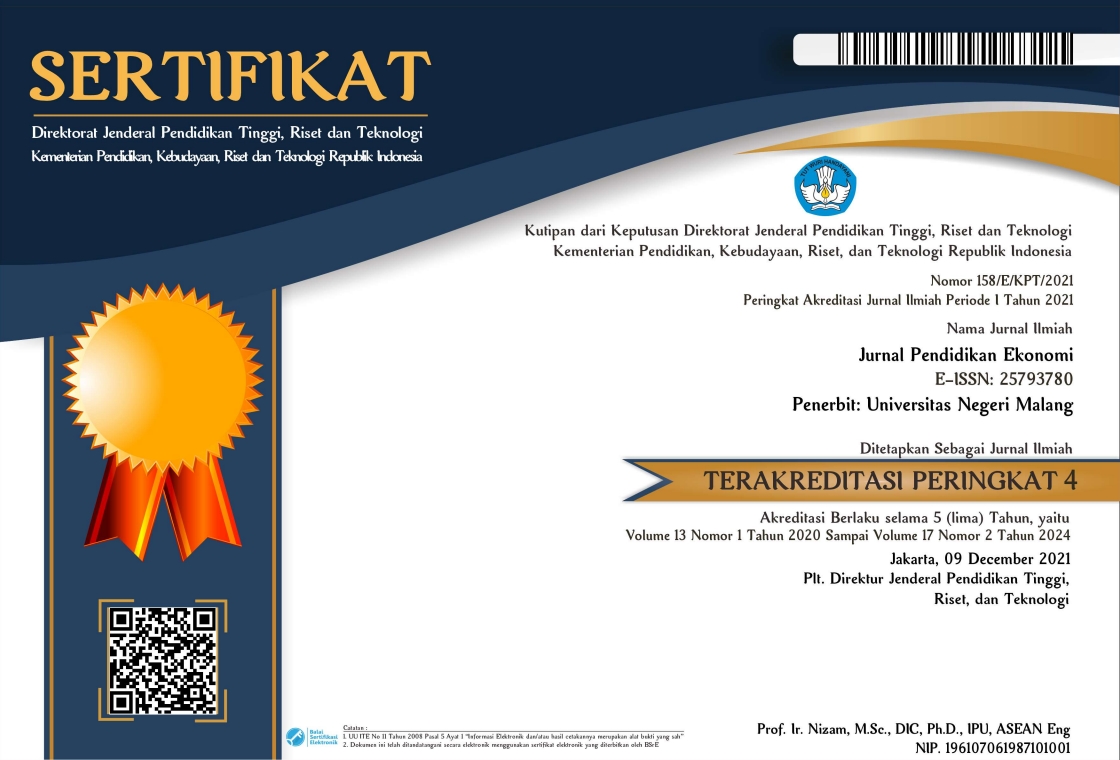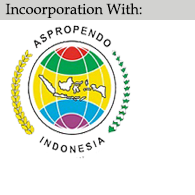E-Modul Interaktif Berbasis Technopreneurship Pada Pembelajaran Proyek Wirausaha
Abstract
Keywords
Full Text:
PDFReferences
Abbas, A. (2018). The bright future of Technopreneurship. International Journal of Scientific & Engineering Research Volume 9, Issue 12. 563-566
Abdullah, A., Fauzan, G.A., & Prasetyo, R.W. (2021). Pelatihan Pembuatan Website E-Commerce Dengan Woocommerce Guna Menumbuhkan Semangat Technopreneurship Pada HMIF. J-ABDIPAMAS (Jurnal Pengabdian Kepada Masyarakat). Vol 5. No. 1. 121-134.
Agustian, N. S., & Hanifah, U. (2021). Peran Teknologi Pendidikan dalam Pembelajaran. Islamika : Jurnal Keislaman Dan Ilmu Pendidikan, 3(1), 123–133.
Asyhari, A., Diani, R. (2017). Pembelajaran Fisika Berbasis Web Enhanced Course: Mengembangkan Web-Logs Pembelajaran Fisika Dasar I. Jurnal Inovasi Teknologi Pendidikan Volume 4, No 1, 13-25
Arianto, B. (2020). Pengembangan UMKM Digital di Masa Pandemi Covid-19. ATRABIS: Jurnal Administrasi Bisnis, 6(2), 233–247.
Badan Pusat Statistik (BPS). 2022. Keadaan Ketenagakerjaan Indonesia Agustus 2022. No.04100.2202.
Culclasure, B. T., Longest, K. C., & Terry, T. M. (2019). Project-Based Learning (Pjbl) in Three Southeastern Public Schools: Academic, Behavioral, and Social-Emotional Outcomes. Interdisciplinary Journal of Problem-Based Learning, 13(2), 8–30.
Daryanto. (2013). Menyusun Modul Bahan Ajar Untuk Persiapan Guru Dalam Mengajar. Yogyakarta: Gava Media.
Denanyoh, R., Adjei, K., & Nyemekye, G. E. (2015). Factors That Impact on Entrepreneurial Intention of Tertiary Students in Ghana. International Journal of Business and Social Research, 05(03), 19–29.
Direktorat Jenderal Pendidikan Tinggi. (2022). Buku Panduan Program Wirausaha Merdeka Angkatan 1. Kementerian Pendidikan, Kebudayaan, Riset, dan Teknologi
Dolatabadi, R. V., & Meigounpoory, M. R. (2013). Effective Determinants of Corporate Nano-Technopreneurship Process in Active Technological Knowledge Base Firms. International Journal of Academic Research in Economics and Management Sciences, 2(5), 137–155.
Erna, M., Anwar, L., & Mazidah, M. (2021). Interactive e-module using Zoom Cloud Meeting platform to reduce misconceptions on salt hydrolysis material. Journal of Education and Learning (EduLearn), 15(2), 283–290.
Hamid, M. A., Yuliawati, L., & Aribowo, D. (2020). Feasibility of electromechanical basic work e-module as a new learning media for vocational students. Journal of Education and Learning (EduLearn), 14(2), 199–211.
Harianti, A., Malinda, M., Nur, N., Suwarno, H. L., Margaretha, Y., & Kambuno, D. (2020). Peran Pendidikan Kewirausahaan Dalam Meningkatkan Motivasi, Kompetensi Dan Menumbuhkan Minat Mahasiswa. Jurnal Bisnis Dan Kewirausahaan, 16(3), 214–220.
Heinich, Robert, Michael Molenda, James D. Russel, (1982) Instructional Media: and the New Technology of Instruction, New York: Jonh Wily and Sons.
Hutahaean, L. A., Siswandari, & Harini. (2019). Pemanfaatan E-Module Interaktif Sebagai Media Pembelajaran di Era Digital. Prosiding Seminar Nasional Teknologi Pendidikan Pascasarjana UNIMED, 1, 298–305.
Iwu, C. G., Opute, P. A., Nchu, R., Eresia-Eke, C., Tengeh, R. K., Jaiyeoba, O., & Aliyu, O. A. (2019). Entrepreneurship education, curriculum and lecturer-competency as antecedents of student entrepreneurial intention. International Journal of Management Education, 19(1), 100295. https://doi.org/10.1016/j.ijme.2019.03.007
Jabeen, F., Faisal, M. N., & Katsioloudes, M. I. (2017). Entrepreneurial mindset and the role of universities as strategic drivers of entrepreneurship: Evidence from the United Arab Emirates. Journal of Small Business and Enterprise Development, 24(1), 136–157.
Mirna Noventri, I., Perawitan Pakpahan, J., Wardani Pane, J., & Hutabarat, L. (2021). Peran Kewirausahaan Berbasis Digital Dalam Mengurangi Tingkat Pengangguran. Journal of Millennial Community, 3(2), 68–78.
Munawar, A., & Suryana. (2020). the Influence of Entrepreneurial Learning and the Motivation To the Entrepreneurial Interest of Students. Jurnal Masyarakat Mandiri, 4(3), 424–435.
Natalia, W., & Jalinus, N. (2021). Efektivitas Pengembangan Modul Berbasis Proyek pada Mata Kuliah Kewirausahaan Akademi Komunitas Negeri Pesisir Selatan. Jurnal Edutech Undiksha, 9(2), 267–174.
Nasution, A.H., Arifin, E., Suef, M. (2006). Entrepreneurship: Membangun Spirit Technopreneurship. Yogyakarta: Andy Offset
Purnomo, S., & Triyono, M. B. (2018). Efektifitas Technopreneurship Dengan Model Pembelajaran Cooperative Learning By Technopreneur For SMK Untuk Siswa Di SMK. Jurnal Taman Vokasi, 6(1), 120–130.
Putri, N. Z., & Elfizon, E. (2021). Pengembangan E- Modul Berbasis Technopreneurship Pada Proses Pembelajaran Instalasi Listrik Industri. Jurnal Pendidikan Teknik Elektro, 2(2), 62–67.
Putri, R. D., Megasari, R., Rahmawati, D., & Munir, S. (2018). Pendidikan Kewirausahaan Berbasis Pembelajaran Kolaboratif untuk Internalisasi Karakter Wirausaha di Pendidikan Tinggi. Jurnal Pendidikan Ekonomi, 11(2), 151–159.
Ricu Sidiq, & Najuah. (2020). Pengembangan E-Modul Interaktif Berbasis Android pada Mata Kuliah Strategi Belajar Mengajar. Jurnal Pendidikan Sejarah, 9(1), 1–14.
Rohmawati, A. (2015). Efektivitas Pembelajaran. Jurnal Pendidikan Usia Dini, 15- 32
Sigit Purnomo, M. B. (2019). Efektifitas Technopreneurship Dengan Model Pembelajaran Cooperative Learning By Technopreneur For SMK Untuk Siswa Di SMK. Jurnal Taman Vokasi Vol. 6 No.1, 120-130
Soomro, B. A., & Shah, N. (2021). Technopreneurship intention among nonbusiness students: a quantitative assessment. World Journal of Entrepreneurship, Management and Sustainable Development, 17(3), 502–514.
Sudarsih, E. (2013). Pendidikan Technopreneurship: Meningkatkan Daya Inovasi Mahasiswa Teknik Dalam Berbisnis. Konferensi Nasional “Inovasi Dan Technopreneurship” IPB International Convention Center, Bogor, Mkk 2308, 1–9.
Sugiyono. (2017). Metode Penelitian Pendidikan. Bandung: CV. Alfabeta.
Snyder, H. 2019. Literature review as a research methodology: An overview and guidelines. Journal of Business Research, 104, pp. 333–339
Umami, N., Cahyono, R. D., & Rini, Y. P. (2020). Pengaruh Enterpreneurship Cooperative Project Based Learning (Enco-Pjbl) Terhadap Peningkatan Kreatifitas Berwirausaha Mahasiswa Dalam Mata Kuliah Kewirausahaan. Jurnal Pendidikan Ekonomi, 05(2), 35–49.
Wardani, I. A., Machmud, A., & Suwatno. (2020). Studi Tentang Pengaruh Techopreneurial Learning Terhadap Technopreneurship Intention Siswa Smkn Se-Kota Palembang. Edunomic: Jurnal Ilmiah Pendidikan Ekonomi Fakultas Keguruan Dan Ilmu Pendidikan, 8(2), 96–106.
DOI: http://dx.doi.org/10.17977/UM014v16i12023p053
Refbacks
- There are currently no refbacks.

Jurnal Penddidikan Ekonomi is licensed under a Creative Commons Attribution-NonCommercial-ShareAlike 4.0 International License





